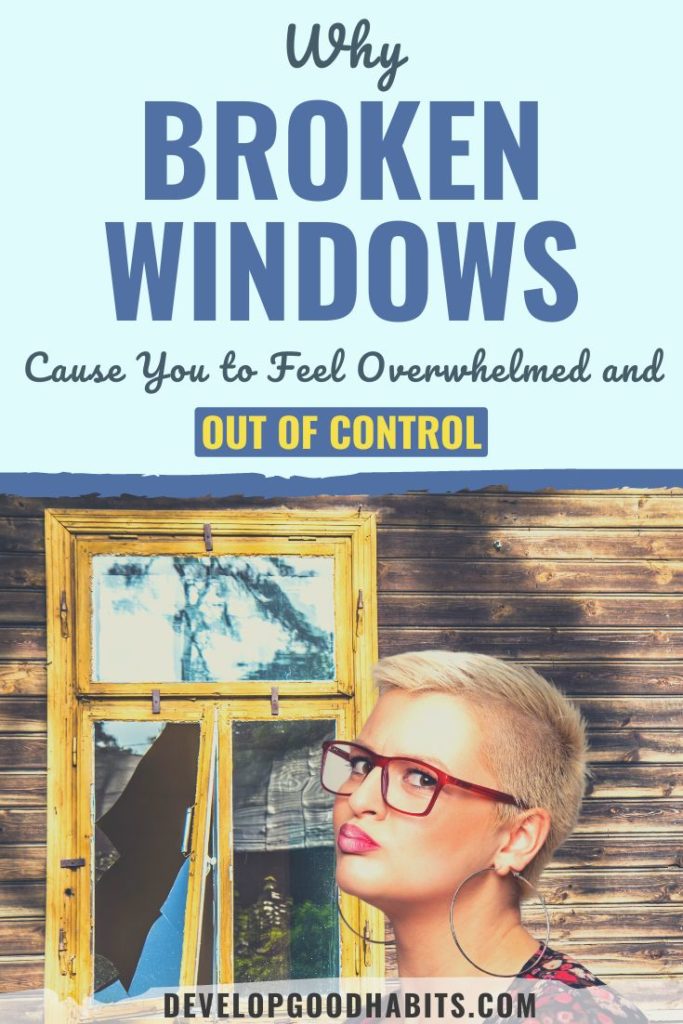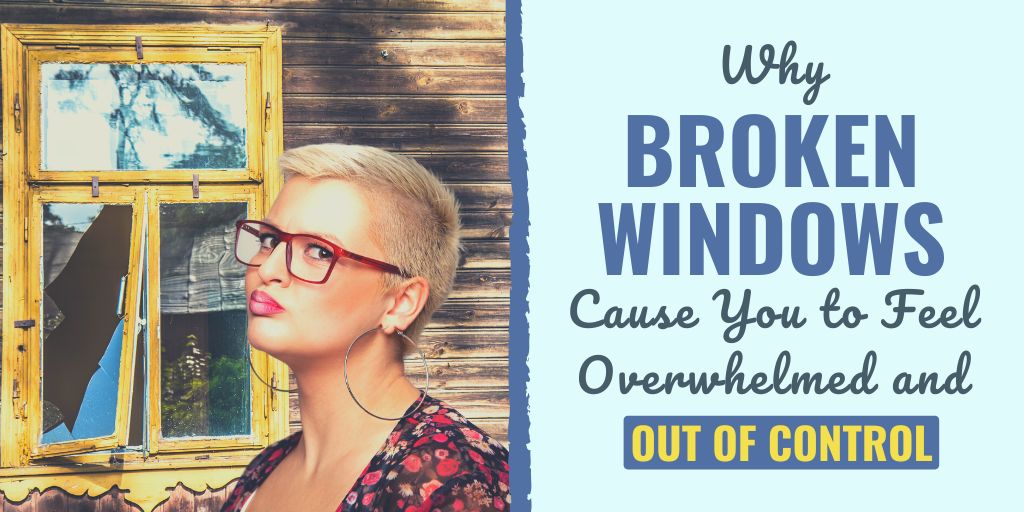If you’re like most people, there are times when you feel overwhelmed and out of control in your life.
You want to take action, but you feel too depressed to do much with your day.
The interesting thing?
There is a specific habit you can develop that will help you minimize the “blue feelings” that often pop up.
And it all starts with a broken window.
Let me explain…
What is the Broken Window Theory?
I first discovered the “Broken Window Theory” in Malcolm Gladwell's book, The Tipping Point, but it started out as an article by social scientists James Wilson and George Kelling published in 1982. (See the article here)
The point of this article is that the small cosmetic damages in a neighborhood can lead directly to large negative social issues. In other words, broken windows, trash on the streets and other cosmetic signs of urban blight, lead to increased crime, anti-social behavior and all sorts of other crime and delinquency.
My first experience with the broken window theory came from a few childhood memories of going to New York City. Being a kid from New Jersey, I was always surprised at the squalor you would see in the Times Square area. It was rundown and filled with porn shops, graffiti, garbage and people looking for trouble.
Eventually, Mayor Giuliani swept in and revitalized the area in the mid-90s. He fixed the “broken windows” of this part of NYC and it’s now a metropolitan Disneyland. (Read this article on NYC’s broken windows social experiment.)
How Can Broken Windows Help with Habits?
You can apply the broken window theory to your daily life. By fixing small cosmetic changes in our personality and routines, you’ll create an atmosphere that helps prevent feeling overwhelmed and out of control.
Recently, Gretchen Rubin, a New York Times bestselling author, linked the idea of the broken window theory to self-help, personal development, and habit change. (See her article in Psychology Today.)
Her theory is simple—most people have a few bad habits that make them feel out of control. By not “fixing” these windows, your day can easily get off track.
Think about it.
What small things cause you to feel anxiety?
Here are a few examples:
We all have our own broken windows. I know I have a bunch. In fact, to prepare for this article, I sat down and created a list of what causes me to feel disorganized, depressed and overwhelmed.
Here is a small part of this list:
If too many of these things happen in a given day, I won’t feel energized or excited about my day. Instead, I want to crawl back into bed and read a book.
How to Fix Your Broken Windows
Now, even if you have a cluttered kitchen it doesn’t mean you’ll be highlighted in an upcoming issue of Hoarders: Buried Alive. We all get disorganized from time to time. But, you should be mindful of how your immediate environment has an impact on your mood.
Just like you can with a real window, you can make a quick fix. Once you’ve identified your broken windows, create habits that prevent them from happening in the first place.
EXAMPLE:
Before, I listed a few of my broken window problems. Now let me show you a few solutions:
I’m far from perfect, but these broken window fixes have helped me feel less overwhelmed. You can do the same by understanding how small things affect your mood and then create strategies to prevent them from popping up.
Take Action and Fix Those Windows!
So now that you understand the theory behind broken windows, let’s talk about a few ways you can take action and apply this information.
1. Look for small wins.
Look for ways to achieve quick wins in your life. “Brush your teeth twice a day” is a lot easier than “quit smoking” or “lose 50 pounds.” These might not seem important at first, but they build willpower and have a cumulative effect on your other habit changes. (Read more about small wins here.)
2. Implement basic 80/20 principles.
There are small negative habits that negatively affect your mood. They might include a small action like making the bed in the morning. But if you get rid of them, you’ll feel less out of control.
3. Build momentum with habits.
Fixing simple habits builds willpower, which creates momentum. And with every success, you’ll have more confidence to tackle harder habits. When you’ve mastered one routine, build on it by trying another.
4. Enjoy the good feelings.
I’ll admit that I’m not a neat freak, but now I actually enjoy making my bed in the morning. The process itself is irrelevant. What’s important is this habit acts as a trigger that prepares me for an exciting and proactive day.
Broken window habits may be small, but the cumulative power of changing them small can be quite dramatic. By identifying these limiting actions, you’ll be on the path to feeling in complete control of your life.
Now I’ll turn it over to you.
What do you think of the broken windows theory? What are YOUR broken windows? How do you deal with them?
Let me know your thoughts in the comments below.
External Sources:
Source 1, Source 2, Source 3 (PDF), Source 4



Wow great advice. I also think it is the theory that those small things to pile up and become big things and then they get out of control. I am busy running a business and it drove me nuts that I didn’t have time to clean the house all the time. I resolved that problem and hired someone. It frees up my time to work on the other small things that mount up.
Interesting. Reading “fixing small cosmetic changes in our personality and routines” I thought the rest of the post will be about what I can do about my urges, not how to clean my flat 😉
I’m more distracted by my lapses than by any external things. For example I’ve scheduled today a free promo for one of my books and spent over 30 minutes on browsing through Amazon reports. I didn’t planned to do that, I have other things on my list! What is more I had a little fight with my wife in the morning and I know it was my fault. So I’m angry with me and I don’t feel like working today.
I agree with BW theory. My fix is to do something small and check it off my to-do list. This gives me a feeling of accomplishment which drive me further through my day.
Hi Steve…….just found your website after buying your anti-procrastionation ebook. Love your outlook, the good suggestions. I will be using these suggestions myself as well as sharing them with my counseling clients.
Awesome Shiela! I am glad you found me here. Have you started the procrastination book yet? What did you think?
Feedback is always appreciated! 🙂
Thanks for giving the book a shot and I hope to see you here more!
Have a wonderful day,
Steve
What an interesting concept. I’ve heard of the broken windows theory before, but I never thought to apply it in my everyday life. I’d be interested to see if some areas improve more than others or if there is a general improvement in all areas of your life.
Recently I’ve been trying to floss more. I know how important it is for your teeth, but getting into a regular habit has been difficult. One thing I do is keep track of how many days in a row I’ve done it. Then I try to keep the streak going. In other words its a game. That’s helped me get the habit going.
There is something about letting your surroundings get bad that affects you. I notice that if the dishes pile up and the trash is overflowing, I let other things slide too. So maybe just some general maintenance is enough?
Steve,
Yes the general maintenance thing is a key to this. Like you, I notice that when the little things begin to slide, it has a cascade effect into other more important tasks. Even something like flossing (what does it matter if you miss a single day of this after all) could perhaps be an outward manifestation of some sort of malaise. Thanks for a great comment!
Hey Scott,
I don’t mean to be a smartass, but isn’t it called “The Broken Window Fallacy”? 🙂
I think you make some good points. Especially on taken care of emails in 1 chunk and immediately going at it. That’s definitely something I’ve gotten better at in the last 2 months, and it feels surprisingly empowering, heh.
Ludvig,
No worries. They are actually two different things. (who would have thought there could be so many broken window things) The Broken Window Fallacy is more an economics thing. The idea being that a broken window should stimulate the economy to repair it, but it doesn’t and showing how some actions that would be thought to stimulate an economy (by replacing the window) actually cause more of a drain on capital.
Probably making a hash of the explanation, I am no economist, the point is they are two separate and distinct ideas, the broken window fallacy being older.
Thanks for the comment!
Sorry bro, I usually like your blog but this is bridge and tunnel crap.
Wrongheaded Rudy gutted New York City and destroyed it’s heart and soul. Search: “Imperial New York: Destruction and Disneyfication under Emperor Giuliani.”
The logical successor to King Clean Up was Billionaire “Soda Ban” Bloomberg.
Maybe you like being surrounded by Midwestern tourists on their way to Red Lobster while being filmed by hundreds of cameras and patted down by NYPD, but we New Yorkers do not.
Rex,
Was actually talking more about the psychological effect that was drawn from the example of the sociological effect. NY was just an example of the problem, not really making a comment either way about what was done to the city. Didn’t live there, don’t know enough to comment on the politics and all that.
Personally, I do miss the the old feel of NY a bit, rather than the Disney version. But I think it is a safer place, so I don’t feel entitled to make much of a comment on THAT side of it either way.
Thank you for pointing this out. I enjoyed very much reading about thid theory, because it’s such a beautiful confirmation to what my instincts were already saying.
I use to have such strong feelings about certain things, that I almost become superstitious – almost 🙂
For example, making my bed in the morning was always so important to me, that it had the power to influence my whole day – now, thanks to you, I understand why. So fascinating!
Thank you so much! I just discovered your website and I find it to be a wonderful space, full of goodies! You really make this world a better place 🙂
This is great information but, now I have spent over an hour reading and not getting things done. Now what??? :0